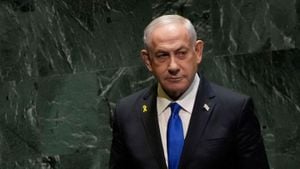US President Joe Biden and Chinese President Xi Jinping reached significant consensus during their recent meeting on the sidelines of the Asia-Pacific Economic Cooperation (APEC) summit held in Lima, Peru. The focal point of this discussion was the assertion of human oversight over nuclear weapons, explicitly stating the necessity of maintaining human control over decisions related to nuclear arms. This agreement was confirmed by the White House, emphasizing the leaders' commitment to steer clear of allowing artificial intelligence (AI) to dictate actions concerning nuclear arsenals. The move is portrayed as aimed at mitigating the risks associated with both nuclear proliferation and AI implementation within military operations.
Specifically, the White House statement noted, “The two leaders affirmed the need to maintain human control over the decision to use nuclear weapons.” Alongside this affirmation, both leaders underscored the importance of developing military AI with caution and responsibility. This handshake moment marks rare progress on contentious subjects like nuclear armament and AI technology, issues which have caused much friction between the two nations previously.
Though the agreement has been verbally recognized, there remains uncertainty about its future impact on broader diplomatic conversations. The United States has long sought China's engagement on nuclear arms talks, yet little meaningful dialogue has arisen. Formal negotiations on this front still appear distant, especially as tensions over China's rapid ascent of nuclear capabilities heighten. Latest assessments from the US Department of Defense estimate China currently possesses around 500 operational nuclear warheads, which could exceed 1,000 by 2030 if the existing expansion drive continues unbridled.
On paper, China adheres to a “no first use” policy with respect to nuclear weapons, projecting its nuclear deterrence strategy as minimal and primarily defensive. This positioning has sparked discussions among analysts and strategists who express concern over the sharp increase of Chinese nuclear capabilities, which includes the modernization of its nuclear arsenal through advancements such as next-generation ballistic missile submarines and hypersonic glide vehicle warheads.
Relatedly, the engagement concerning military AI is relatively new, having gained traction recently. Previously, China and the US had their inaugural formal discussions on AI applications within military contexts back in May, yet nuclear decisions were not part of those discussions. While there has been movement toward talks on these potentially explosive topics, China has also been criticized for its non-responsiveness and reluctance to engage fully.
During this meeting, Biden reportedly encouraged Xi to play a constructive role by reining in North Korea’s support for Russia amid its aggression against Ukraine. Analysts note Biden's strategy is aimed at emergency-proofing the US-China relationship before Donald Trump potentially alters the political dynamics following his re-election.
Despite common ground being established during their notable meeting, historical discord remains evident and could resurrect with the USA's shifting political climate. Biden's approach of managing the US-China relationship through dialogue stands at risk with Trump's hawkish stance likely bringing forth increased tensions, especially if Trump follows through with aggressive trade policies against China.
This summit marked the end of Biden's presidency, with the coronavirus pandemic causing disruptions to many international discussions. The leaders’ emphasis on preventing military confrontations showcases the fragile nature of peace and cooperation between two of the world's largest economies, whose future relationship may hang precariously on the result of the upcoming transitions.
Following their discussions, both leaders reiterated their intent to stabilize the overall U.S.-China relationship. Xi noted the need for both nations to inject “more certainty and positive energy” amid the global uncertainty, with Biden emphasizing the importance of direct conversations to avert miscalculations and maintain the competition between their two nations without slipping through the fingers of conflict.
Weathering strained relations has long been the theme of U.S. and China’s diplomatic ties; the recent dialogues serve not only as groundwork for stability but also as symbolic gestures to affirm commitments to avoid rampant militarization and conflicts spurred by AI. The success of these discussions and whether they translate to actions remain to be seen as both nations appear to be preparing for significantly different political landscapes.



